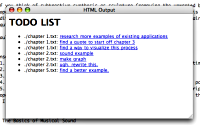Scoble interviewed Steve Ballmer (transcript, announcement). Finally!
While watching the short video I was struck by the realization that the Steve Ballner shown here is not that different from the one in the monkey dance video. Even worse: the video shows that Ballmer is a scary, scary man. He looks like a gnome, a ghoul, with the eyes of a predator. He doesn't seem genuine, real, or honest; and he is striking an upbeat pose that does not fit.
Read on for an analysis of the video.
Full entry
I've just started using TextMate. My initial assumption was that it is still early in the development process, so I planned to wait for a later release before I would decide if I should register a copy; but then I started using it for a couple of days and found several functions that blew me away.
 This window is opened by TextMate's TODO-command: it collects a list of your TODO-markup of files in the current document's path (see text for details). |
Read on for my review.
Full entry
Just saw a guy on a bike who was listening to Hip Hop playing on his cell phone. He was actually using it as a music player, not as a ringtone; and while he was riding along he subtly grooved to the music, occasionally glancing around if he was passing anyone he knew, or if anyone was watching. It seemed strange at first, but then I realized that I had seen this before, in a different context: There are more and more young people on the streets and in parks who use their cell phones as a way to play music to other people, mostly young males, gathering in groups, in front of a car or a club. They're essentially using their phone as a modern-age ghetto blaster.
It seems odd at first to use the cheap and weak speakers of a phone in this way, but when you think about it it's not that strange. Ghetto blasters were never about high fidelity sound. They were a method of communication, they were about group-building, and about attention.
I once had an interesting conversation about ringtones, with a guy during a long train ride back to Berlin; my position was that it's a fad, that the ringtone market would crash as soon as people found out about their phone's MP3 capabilities, and that to me ringtones were more an annoyance than a new way to express yourself. His answer was surprising: He explained that in his culture (he was a Turk born in Germany) people use ringtones as a means of communication, as a gesture. He explained that Turks are an emotional people, and that music was an important medium to convey emotion; and so he was overjoyed by the fact that he could now send ringtones as a gift to his friends and family, to his girlfriend. He wasn't annoyed about the bad quality, or the high prices; he was happy about the fact that he could share songs that meant something to him, that had a meaning to him and the recipient of his gift.
What I'm trying to say is this: You often overlook the potential of things you are seemingly well-acquainted with. When you're working in a field of technology, be it IT or cell phones, you usually make assumptions about what you want to enable people to do, about what they will want to do with your technology. And, of course, more often than not your assumptions will turn out wrong.
They will find ways to integrate your technology into their lives without your supervision. They will find an emotional connection to technology, and you can't anticipate what kind of connection that will be. They themselves will want to decide how to use the things they can buy. Usually this involves sharing the experience with other people. It's always been that way, and it will never change.
Another wonderful podcast from Dave Winer, which starts off as a monologue about his recent Audible experiences, sidesteps into a little DRM history, and ultimately comes to the center of the problem with current media distribution: Customers are treated like thieves, there's too much distrust, and it seems as it's building up. His prediction is actually a lesson he learned as CEO of a software company in the 80ies: ultimately users will learn in how many ways DRM screws their side of the bargain, and that's when the model stops working.
This is quite an emotional podcast for Dave, and you can hear it in his voice, in a way that text can't convey. Not only was he mistreated by a company he was a good customer of, but he also was confronted with a CEO who would rather have a user's public voice censored than have to deal with it and improve the product, react with a public discussion, or even simply acknowledge the problem publicly.
I love podcasting for these moments, for the layers of communication that a voice opens up, for meaningful pauses, sighs. There are moments when I was surprised by the level of vulnerable emotion Dave shows, when his voice cracks up, when he is lacking words because this incident he is talking about has shaken things up deep in himself; the conversation with Don Katz has affected him, he almost seems like a child that has been hurt by a very close friend and still makes an honest effort to explain his position. And that's what I like about Dave Winer: he can certainly be self-involved and narrow-minded, but in this podcast he shows both that he has really good ideas, and that he deeply, deeply believes in honest conversation, even if it means to publicly demonstrate your vulnerability. Which makes a podcast that is both informative and emotionally gripping. Take that, mass media.
And btw, Dave: yeah iTunes is a slow hog, but only because you're using the Windows version. Get a Mac already.
Via Dave Winer: Apple seems to be caching podcast feeds and MP3 files as part of their iTunes podcast integration. The Dailysonic blog gives several reasons why this is bad for the content producers, and could even cost them money. In a nutshell: Podcast producers need their subscriber numbers for the advertisers. And, worst of all from a listener perspective: The caching mechanism seems yet to be unreliable, which means that some podcasts never reach the listener.
Hm, I see... I was wondering how Apple were keeping track of their subscriber count. Routing it over their servers makes sense for them, as they now can watch the listening behavior of all users. It's clear that the user behavior data is just as valuable to them as it is to the podcast producers. This data is likely one of the reasons they're interested in the technology in the first place:
- They want to know what other content they need to offer. They want to know which content generates which amount of interest.
- They sell advertising space themselves (in the iTMS). For this they need the same data as the actual content producers, for most the same reasons (see the article linked above).
- They probably sell user behavior data to content producers (read: Music/Entertainment Industry) who want to be able to watch the podcasting market.
Essentially, with a single Software release Apple has gained a position to generate lots of interesting data. Their position in this regard is not unlike that of Technorati and Bloglines for the "blogosphere". With an important distinction: they're not likely to make any of that data public. To me it seems likely that Apple will simply not react to the requests to give up their caching until they have another mechanism to get the behavior data (provided they don't already have one; it has yet to be analyzed what actually happens when you subscribe to a feed, or download a podcast).
Just stumbled over Alex Payne's blog and was so delighted about his witty prose that I decided on a whim to do something for his Google ranking. Even if you're not interested in web development, or in his commentary on Apple consumer products, you still might want to take a look at the site for the entertainment value alone. For example: The iPod Story, and his Google "world domination" commentary Not So Evil.
I'm in desperate need for a better backup strategy. By now it has become clear that our data storage media are utterly unstable; I've had lots and lots of misburned CDs, CDs that I can't read after years or even months, of after I change CD drives; I've had backups on DVDs that only can be read on specific computers, and at least four hard drive crashes (that I can remember) during the last 3-4 years. So I'm always interested in what other people have to tell about their experiences.
Read on for more.
Full entry
I just read another rant about the many weaknesses of PHP, and of course I'm in complete agreement. Over the last years I've come to use PHP more often than I would have liked to, simply due to the fact that it's pretty much the only scripting language that is available virtually everywhere; and in contrast to Perl I don't have to look up function calls and the language reference as much, simply because it is closer to what I'm normally using (namely the C languages, and Java).
But the reason I'm posting this is not my urge to awaken old language discussions, but rather an interesting sidenote on the page linked above: Why isn't JavaScript the most popular server-side scripting language? To which my reply is: yeah, why not?
Read on for some suggestions.
Full entry
miniplayer is a minimal interface plugin for musikCube. it has basic
player controls, a search field, it can access your playlists, there is
a simple behavior-controlled suggestion mechanism (which is just a fancy
way of saying "SQL query"), and a couple of small things that make life
easier.
I probably like the search field the most. type in a word and hit enter:
the search result is sent to "now playing", and miniplayer immediately
starts playback. instant gratification. if no songs are found the search
field keeps focus, so you can correct your query and try again.
I still have to use the suggestion thing for some time to see if it's
actually useful. the idea was to support diverse types of listening
behaviour: keeping track of new music that you recently imported/ripped,
but also accessing favorites that you like to play more often than
others; and sometimes you might want to listen to all the stuff that you
never listen to. you can look at "now playing" to see what gets chosen.
in album mode, all these functions select a full album instead of a list
of random tracks.
try it out at http://dekstop.de/musikcube/.
last.fm remote control is a client for the last.fm stream webservice,
implemented purely in html+javascript. this means that you can control your last.fm radio stream
with an html page, with some limitations.
it has the big advantage that it's snappy. no sucky skinning problems, it loads in a breeze, doesn't crash or hang your pc. and you can bookmark radio stations!
and: you don't have to give your last.fm-password to a stranger (i.e., me) in order to use this. all communication takes place between your computer and the last.fm-servers; I won't see your username, not even your session ID. this page won't autoconnect to my server to "check for software updates", and transmit some user data along the way. I don't trust closed-source software that requires your login data, and neither should you.
try it out at http://dekstop.de/lastfm/.


